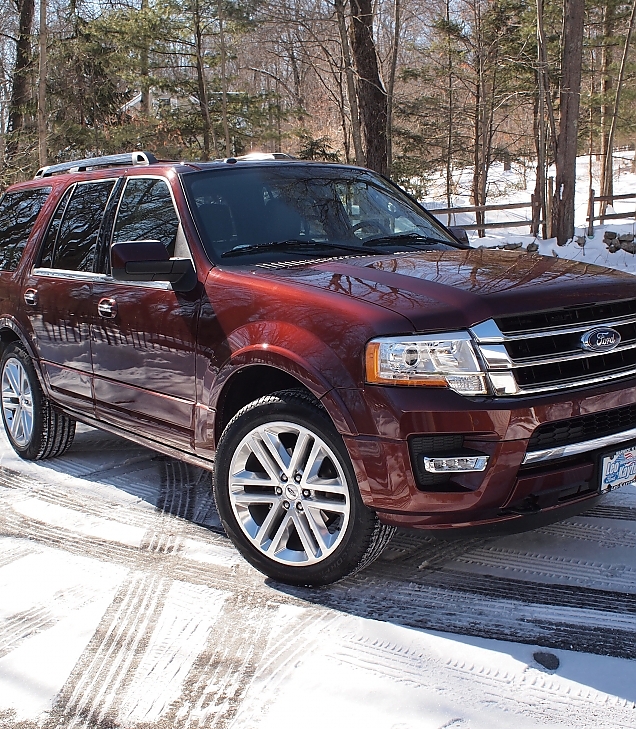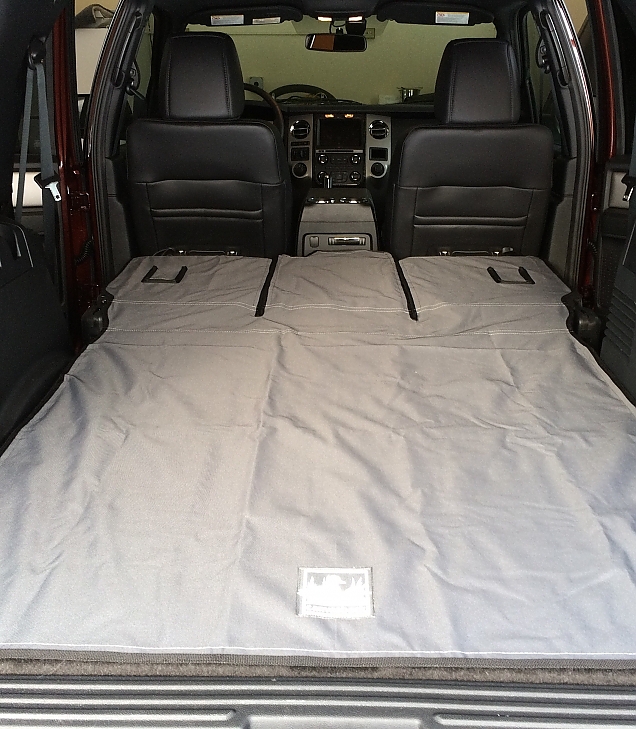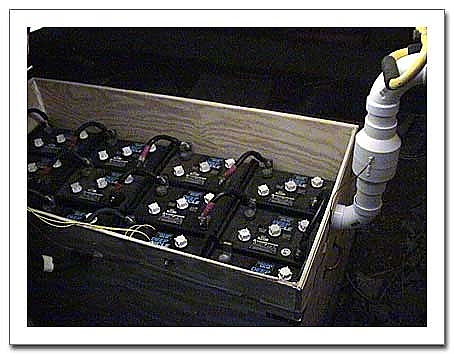Posted by: Rick
Ford Expedition, that is.
For three years we'd been wanting to replace our Chevy Suburban (Big Red) with a newer truck. After all, Big Red was born in 2002, and had well over 100,000 miles on him (her?). If we were going to move to the cabin and subsequently pull an RV around the country, we knew we needed a new truck.
But, we could not find an adequate replacement. We had hoped to get a new Suburban because of our loyalty to Chevrolet and the great experience we'd had with a long string of Suburbans and Tahoes over the years. But, Chevrolet had completely screwed up the cargo area several years ago. We need a large cargo area where the seats can either be removed (like in Big Red), or folded flat. Flat and level. Turns out, while you could get the cargo area in new Suburbans relatively flat, the surface was certainly not level. This is not good at all for the dogs because they'd slide to the back of the their crates. I can't imagine it works for other cargo either including groceries and other supplies. Stuff would just slide to the back of the truck. Really dumb.
I guess since 2002, the Suburban was no longer considered a working truck but rather a soccer mom / big family transport vehicle and the size and weight and 4WD was all just show.
We heard rumors that the 2015 model would fix the cargo area fiasco. So, we waited.
It didn't.
So, we looked around at Toyota (Sequoia), Nissan (Armada), and Ford (Expedition). The Toyota was ruled out, even though it had an adequate cargo area design because it seems very big and not very responsive. After all, this would be the car Lynne often used for shopping and running errands up till the time we move. We ruled out the Ford because of the way the second row seats folded. We liked the Armada and were on the verge of buying one when we discovered that the Ford Expedition second row seats did fold flat and level! And, after a couple of test drives at Leo Kaytes Ford in Warwick, New York, we were sold.
However, Lynne had the brilliant idea to trade in our Subaru Tribeca (Becky) instead of Big Red. That way, we could use Big Red as our "beater" truck at the cabin. I was planning to buy an old used Jeep Wrangler to use for 4WD, fishing, and to put a plow on it for winter. But, if we kept Big Red, he (she?) could fill that role and we would not need to buy a vehicle. Brilliant.
So, we said goodbye to Becky (she was an annoying car, but to be fair, a very reliable one) and bought a 2015 Ford Expedition. With all the bells and whistles.

Next challenge. We like to line the cargo area with a canvas liner to protect the carpeting and seat backs. And, we've always bought our liners from Canvasback. But, they did not have what we needed. We needed a liner that would protect the entire cargo area with the 3rd seat folded down. (We never used the 3rd row seat in the Suburban and likely won't in this truck either.) And, with the 2nd row seats either up or down. I talked with the people at Canvasback and they were willing to make a custom liner. I did the measurements, drew up a proposed pattern, and sent it to them. For $159 they made a beautiful custom liner. Now that it is installed, I'd make one change to the pattern (and I've told them this in case I need to replace this some day), making it easier to raise and lower the 2nd row seats.
Canvasback custom liner:

If you need a liner for the cargo area in your car or truck, get it from these guys. They are great! While I was at it, I replaced the old, dirty liner in the Suburban.
So, now we have two large 4WD SUVs. But, I must say that the Ecoboost V6 engine on the Ford is getting good gas mileage. And, it will do very well towing Lady Bug, and any subsequent RV we choose.
We've taken another step on our way to life at the cabin! Oh, and we've named the Expedition Lex and it is definitely a guy!
Posted by Rick on 02/28/2015 at 08:01 AM
Tags:
photos,
t@bbing,
lex
Filed under:
Getting There
Permalink
Posted by: Rick
It is interesting that you spend many years of your life accumulating things, then reach a time when you need to get rid of those same things.
We are about to move from a 4 bedroom, 3-1/2 bathroom, 2500 (ish) square-foot house with a basement, into a 1000 square-foot, one room, log cabin with very little storage. And, the cabin is pretty well outfitted already with kitchen gear, clothing, furniture, etc. What are we going to do with all this stuff?!
We are going through the house, room by room, cleaning and sorting. We are putting everything we own into one of several categories:
- We need it at the cabin and will find some way to cram it in.
- We likely need it at the cabin, and will store it somewhere close (maybe Laramie) where we can get easy access.
- We want to keep it, perhaps for some future second home, so this also goes into storage.
- We don't want it and it has value and we'll give it away. Goodwill Industries is a candidate charity.
- We have a lot of vintage and antique items that we will try to sell to a local dealer.
- There are some things we can leave with the house, if compensated. New owners would likely need the tractor, generator, pool equipment, for example.
- There is a lot of stuff that just needs to be thrown away. Hate doing this, so it is a last resort.
- Everything else will go in an estate sale once the house is sold.
We've been told by our realtor that we need to "declutter" the house. A polite way of telling us we've got too much stuff, I think. So, our priority is on getting the house looking good for showing. That means working on everything that can be seen as you walk through the house. We'll work on the "hidden" things in cabinets and cupboards later. We've got the upstairs in pretty good shape with one bedroom that we used as a junk room still needing some care. The bathrooms and closets upstairs look pretty good. So, it is just in need of a deep cleaning next.
Downstairs, the living room is okay, but still needs some decluttering. The dining room is in good shape and we've whipped the office into a presentable state. The kitchen is not bad, but the garage needs work. We've boxed up and given away hundreds of books with many more to go. There is a local Friends of the Library charity that will take these.
Then, there is the basement. What a mess. But, it is too damned cold to try to tackle that right now. There are boxes and boxes of stuff we moved from Colorado, some of which have never been opened! There is the cheese making and wine making equipment. (I'll keep the cheese making gear.) Unused furniture, tools, dog showing paraphernalia, puzzles, record albums, (this list could go on a long time).
We meet with the realtor to sign a contract and kick off the selling process on Wednesday. We'll be asking him for recommendations for local storage facilities--we'll move stuff we want to keep out of the house as much as possible. We need to find a cleaning service or house cleaner that can help us get the house into showable shape and keep it that way.
And, we have a few minor repairs to make and some painting to do. Shampoo carpets. And, we'll be good-to-go!
Posted by Rick on 02/16/2015 at 07:33 AM
Tags:
moving,
at-home
Filed under:
Getting There
Permalink
Posted by: Rick
This post really has two related topics. I'll start with winterization.
It gets cold at the cabin. It is not unusual to see a day or two where the temperatures are -30°F, and that is without the wind chill. So, if we don't keep the cabin heated in the winter, it is wise to winterize it so we don't suffer from broken water pipes. (We actually do try to keep it heated in winter, but not always with success. But, that is the second part of this story.)
Winterizing is not really that difficult. Here are the steps:
- Turn off the water pump at the electrical panel
- Open all the faucets and run water until there is no more pressure, flush the toilet until the tank does not fill any more
- In the crawlspace, open a faucet that drains the pressure tank
- Also, open the two faucets that drain the hot and cold water lines that feed the sinks, tub and toilet
- Pour RV antifreeze into the drains and toilet
- Turn the hot water heater to the "Pilot" setting
It seems there should be some risk of the peanut butter and jelly (and other liquid-ish food items) freezing, but that has never happened.
I don't drain the hot water heater. I used to. But, nowadays I just leave the pilot running with the thermostat turned down. I think the small amount of heat from the pilot light keeps the tank warm enough to prevent freezing. I hope so. It has so far.
One could argue that we don't really need to winterize since we have a propane forced-air heater that we set to 45°F when we are gone. That is meant to provide enough heat to keep the cabin from freezing, which is not only good for the plumbing, but for everything else from the logs to the furniture. However, I still winterize just in case the heater doesn't work.
The heater could "not work" for a variety of reasons, most notable is the loss of electricity. Since the house is powered by the sun, if we lose the sun for several days or if snow accumulates on the solar panels preventing them from working for a few days, it is possible to drain the batteries to the point where the inverter shuts down and stops providing AC power. In that case, the heater won't work, of course.
But, we've been suffering from a greater heater woe for a couple of years. The pre-ignition blower will come on to evacuate any accumulated gasses and equalize pressure in the system, then a pressure switch activates and allows the burner to ignite and the main blower to come on. The problem is that the pressure switch never activates, so the heater never comes on. And, in the meantime, the pre-ignition blower just blows and blows and blows until it drains the batteries.
Last year, Grant from Laramie Heating came up and cleaned everything and got it working. And, he left me with a replacement pressure switch in case it acted up again -- which it did. So, I replaced the pressure switch and everything was working when we left last September. A neighbor has checked on the cabin once a week since then, and this week discovered the pre-ignition blower blowing. And, blowing. And, blowing. It could have been going as much as eight days! So, he turned off the heater.
I am sure glad the cabin is winterized!
I'll call Grant and see what he thinks. It may be time for some new heater guts or even a new heater because we can't have it not working next winter! I'll keep you posted via comments or additions to this post.
Posted by Rick on 02/12/2015 at 10:06 AM
Tags:
cabin,
weather,
maintenance
Filed under:
Projects •
Winter
Permalink
Posted by: Rick
That's what the HR people call it: "phased retirement". It is a process where a person, as they retire from a company, sticks around to help transition to and train a replacement, often on a part-time basis. It is a way of allowing the retiree to move out of a high-demand, intense and/or stressful job, and still contribute to the company while bringing new talent on-board. That's me. I'm working toward a phased retirement.
I've given the company notice about my desire to retire soon. I don't yet have a firm date, and can't really stop working until our house in New Jersey sells. So, the strategy is to list the house for sale starting in April. Assuming we'll have about 2 months between a contract and closing, we'll have enough time to set a retirement date and do all the things needed to stop work and retire to the cabin in Colorado. At work, knowing I'll be leaving sometime soon, my boss is going to move forward to replace me now. I'll "step aside" from my job, someone else will come in as my replacement, and we'll work side-by-side for a while. That way, I can phase out of work, working until the house closes. And, the new person can learn the job with me available as a coach and consultant.
It is a bit scary. I've been in this job for 9 years and loved it. It is the longest period I've ever had a single job assignment. I love the people, the products, and all the experiences I've had. But, it is time to move on to the next chapter in our lives. A chapter that will be captured in this blog.
And, Lynne and I have made big changes before. Within a year of getting married we moved to Germany for a little over two years. In the late 80s we moved to The Netherlands and after a few years there, we moved to France. We came back to the US in the mid 90s, and had a nice long run before moving to New Jersey in 2006. So, moving and change are not new to us and we are really excited about starting the next chapter.
Posted by Rick on 02/05/2015 at 12:31 PM
Tags:
retirement
Filed under:
Getting There
Permalink
Posted by: Rick
Our "off the grid" cabin is a battery powered cabin. We are truly "off-the-grid" and get our electricity from the sun and wind. (We do have a backup generator.)
On sunny and/or windy days (and there are plenty of them), we get most of the electricity we need during the day directly from the solar panels and wind turbine. Any excess electricity we generate beyond what we use, is stored in batteries located in the crawlspace under the cabin. We then draw from the batteries at night, or when there is little sun or wind.
The batteries are in a plywood battery box I built. It is about 4' long, 3' wide and 2.5' high with a tight-fitting lid. It can hold up to twelve 6-volt batteries. We have a 24 volt system, so the batteries are wired in banks of 4 batteries in series. Then, each bank is wired in parallel with other banks. Right now, we have 8 batteries, so 2 banks of 4.
(Here is a photo of the original battery system, which was replaced many years ago. You can see three banks of four batteries and the evacuation fan.)

And, they are old.
Batteries used for off-the-grid applications are deep-cycle batteries--different from what you use in your car. To start your car, you want a battery that can provide a huge amount of current for a very short time to start the car, then be charged back to full capacity quickly. For an off-the-grid application, you want a battery that can provide a more modest amount of current over a long period of time and use up to 40% to 50% of its capacity before being recharged.
The batteries we have now are wet-cell, deep-cycle batteries. That means they need to have distilled water added occasionally. And, that when they charge they give off hydrogen gas. Thus the battery box, which encloses the batteries and is vented to the outside. A small 24V ventilation fan comes on whenever the batteries are being charged, and exhausts any gasses in the box to the outside of the cabin. A critical safety feature!
Deep-cycle batteries have a lifetime specified in discharge cycles. A cycle is usually defined as a single discharge to 60% or 50% capacity. Lifetimes can range from 800 or 900 cycles up to 1500 or so cycles. It depends on the battery. And, the more cycles the more expensive the battery. After this number of cycles of discharge and recharge, batteries need to be reconditioned or replaced.
Our batteries are about 10 years old. They only cycle when we are there to use electricity. Or, when we are not there and we have several days where they don't charge. (There is electrical use even when we are not there since we leave the propane forced-air heater on and set to 45°F.) Still, they have had many cycles, and some to levels well below 50% or 60% of their capacity. Before we move in full-time, we need to replace the batteries.
To follow my research and decision on new batteries, click through to "More..."
More...
Posted by Rick on 02/03/2015 at 06:34 PM
Tags:
cabin,
solar,
wind
Filed under:
Projects
Permalink



